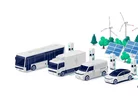Top 10 reasons EVs should be used in the supply chain

Supply chain professionals are faced with the dilemma of initial cost savings and remaining in the internal combustion engine (ICE) era or investing in the future and adopting electric vehicles (EVs).
Many of the questions arise because of uncertainty around the benefits of EVs in the broader supply chain, but also the inherent technologies to adopt and adaptations to be made to their processes. Here are some reasons why supply chain businesses shouldn’t be afraid to venture into the realm of electrification.
10. Increase stakeholder engagement
Consumers, customers and investors are increasingly preoccupied by the sustainable credentials of the organisations they are affiliated with, therefore making it beneficial for fleets to be conscious of their environmental impacts. Aside from environmental, social, and governance (ESG) efforts, investors are continually looking at those businesses leveraging the latest innovations to stay ahead of the curve in an evolving supply chain landscape.
9. Reduce risks in the supply chain
Digital integration enables better insight into 24/7 supply chain activities. With more visibility and predictive analytics, supply chain businesses are able to foresee events on the road ahead, understand when their vehicles are running low on power, and map out the route ahead to incorporate charging, the necessary breaks for drivers, all while taking the fastest, most efficient route possible.
8. Reduce noise pollution
While not necessarily detrimental to the planet, the ability to reduce noise pollution is one of the social obligations of supply chain businesses. Historically, noise has been a critical factor in road transport legislation, but if there is one bonus factor of electrified vehicles it’s the quiet nature of their motors.
While it’s not necessarily deemed safe for vehicles to be silent, addressing noise pollution is one of the added benefits for fleet managers as they expand their sustainable operations.
7. Improve driver safety
The all-electric platform has uncovered new options for safer transportation. The dawn of autonomous vehicles and advanced driver assistance systems (ADAS) gives operators and drivers peace of mind that their machines are smarter and more capable of reacting to charging in the driving environment than those in the seat.
The onus is on the developers to educate drivers and operators to understand how reliable autonomy can be, which will later present health benefits in a high stress industry—taking the pressure off drivers when focusing on the road.
6. Increase flexibility in operations
Many forget that EVs are not exclusive to the road. Organisations in construction, mining, warehousing, and ground supporting vehicles for aviation are already adopting electrified machines for their operations. Shifting to electric across these areas means that businesses can achieve the clean and agile benefits of all-electric vehicles while leveraging opportunity charging to ensure vehicles always have power.
5. Reduce supply chain emissions
A reduction in Scope 1 emissions is crucial for corporate sustainability, but EVs also play to the added benefits required in the supply chain. The lack of demand for fossil fuels, and minimal components to make them, opens up great opportunities for reduction of all Scope emissions.
4. Increase vehicle reliability
How often is time or money spent on repairing engines, gear boxes, and other mechanical components of traditional vehicles?
EVs have the added benefit of minimal moving parts, which is why many see them as being more reliable than their combustion engine counterparts. Also leverage connectivity, fleet operators are able to gain real-time insights into the performance and status of their vehicles to carry out maintenance faster.
3. Reduce operating costs
Businesses don’t want to be caught out by the fluctuating costs and generally high fuel prices involved in running ICE vehicles. Fleet operators can benefit from digital management support from their EVs to allow them to not only figure out the most cost-effective ways to charge their vehicles, but they can also work with charge point operators and installers to establish smart grids, allowing them to completely shift the way their vehicles use power.
2. Improve energy consumption
The cost of energy is growing significantly. The only way to reduce operational costs, both in terms of finance and environmental impact, is to reduce the amount of energy used to complete business tasks. Following trends in the EV industry, digital technologies are becoming more proficient in managing the way energy is used and how much it costs the end user—mainly through smart charging, but regenerative braking is a solution yet to be leveraged to its full potential.
1. Eliminate dependence on fossil fuels
The inevitable is happening and fossil fuels—as non-renewable resources—will one day be depleted by an overwhelming dependence by various industries. Realistically, for organisations to remain successful in later years, it’s important to move with the trends and future proof their logistics operations for years to come.


